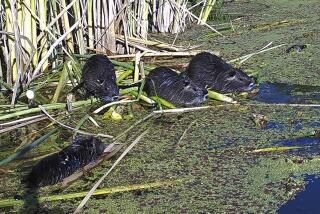Editorial: You dirty rat poisons!
- Share via
The so-called second-generation rat poisons that have been developed in recent years never should have been allowed on store shelves. It was obvious from the start that a poison that remains in a rodent’s body long after it’s dead would end up poisoning the animals that eat the rodents — including household pets, foxes, golden eagles and owls. In fact, the animals the pesticide is most likely to kill are the ones that naturally keep rat populations down by preying on them.
Testing of birds of prey in San Diego County found that more than 9 in 10 had rat poison in their systems; the pesticide is also found in more than three-fourths of the state’s mountain lions. Last week the California Department of Pesticide Regulation took important steps to limit the use of these long-lasting anticoagulants by banning the sale to consumers of 12 products sold under the brand name d-CON. Professional exterminators and vector control agencies will still have access to the poison. The new rules take effect in July.
The U.S. Environmental Protection Agency has been stymied since 2008 in its efforts to do the same thing. At first it worked with pesticide companies to limit the use of second-generation rat poison, and almost all of the companies cooperated. The one holdout has been Reckitt Benckiser, the maker of d-CON, which last year appealed a more forceful EPA regulation to end consumer sales. That appeal is expected to take at least three more years to resolve.
California’s decisive action will cut significantly into the sales of these dangerous d-CON products. Earlier versions of the anticoagulants work for most rat infestations (as do traps), but consumers, not knowing that, tend to reach automatically for the strongest possible product. And in cases in which lesser measures don’t work, the more dangerous chemicals can still be used by professionals, who at least know how to use them in ways that best prevent accidental poisonings.
Second-generation rodenticides are dangerous even when animals ingest them in sublethal doses. The anticoagulant makes them lethargic, wildlife experts say, so they are more likely to die from exposure or be hit by cars.
In addition to California’s action, various municipalities across the country have persuaded their local stores not to carry second-generation rat poison. Reckitt Benckiser’s resistance means that in most states, there will still be years of sales of a dangerous product. It is also unfair to the dozen or so rodenticide manufacturers that have been good corporate citizens.
More to Read
A cure for the common opinion
Get thought-provoking perspectives with our weekly newsletter.
You may occasionally receive promotional content from the Los Angeles Times.






